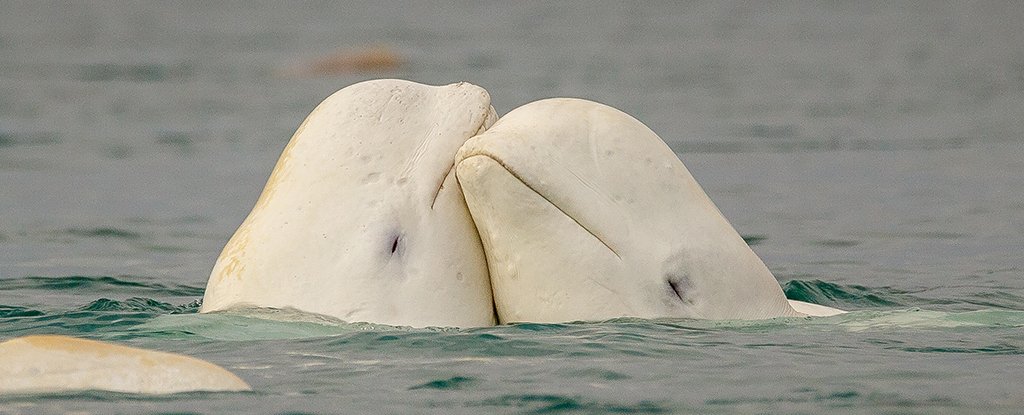Menopause is rare in the animal kingdom. It’s been documented in just a handful of species, including humans.
But there’s one taxon where the phenomenon has emerged in several species. Some female toothed whales, such as orcas, beluga whales, and narwhals, also live long after their reproductive years are done.
The rarity of menopause makes sense, when you think about it. The success of a species can be greatly enhanced by maximizing reproduction, so it seems counterproductive for an animal to evolve a trait that prevents baby-making.
This raises the question: why has it emerged the way it has, in the species it has? Well, a new study of toothed whales led by animal behaviorist Samuel Ellis of the University of Exeter has given us an answer.
Females of whale species that undergo menopause don’t have shorter reproductive lifespans than other species of similar size. Rather, they have longer lifespans overall, living around 40 years longer than other same-sized whale species that don’t undergo menopause – to the benefit of the entire clan.
“Previous research on menopause evolution has tended to focus on single species, typically humans or killer whales,” says behavioral ecologist Dan Franks of the University of York in the UK.
“This study is the first to cross several species, enabled by the recent discovery of menopause in multiple species of toothed whales. Our study provides evidence that menopause evolved by expanding female lifespan beyond their reproductive years, rather than from reduced reproductive lifespan.”
There’s a lot about toothed whales that eludes our understanding. Their lives are mysterious in part because of how difficult they are to observe in their natural habitat.
But studies have shown that whale menopause confers some surprising benefits. The presence of grandmothers in a pod of orcas means that the youngsters have a greater rate of survival in the wild. They lead the pods, and can guide them to hunting grounds, especially when times are hard.
What we don’t know is how it evolved. There are two possibilities. One is that menopause emerged by increasing the total lifespan of the species in question. The other is that the reproductive lifespan was cut short.
frameborder=”0″ allow=”accelerometer; autoplay; clipboard-write; encrypted-media; gyroscope; picture-in-picture; web-share” allowfullscreen>
It was discovered only a few years ago that like orcas (Orcinus orca), short-finned pilot whales (Globicephala macrorhynchus), false killer whales (Pseudorca crassidens), narwhals (Monodon monoceros), and beluga whales (Delphinapterus leucas) all undergo menopause as well.
With various similar animals developing the trait on their own, Ellis and his colleagues had a prime opportunity to conduct a comparative study with other cetacean species to see if they could find any clues.
They found that female whales that experience menopause live significantly longer than females of comparable species.
And, interestingly, males of the menopausal species don’t necessarily get the same benefits. Female orcas, for instance, stop reproducing when they’re about 40, but can live into their 90s. Male orcas typically have a natural maximum lifespan of around 60 years.
This strategy fits in with the grandmother hypothesis. Wise, strong leaders are retained in the pack, without being a source of reproductive competition with their daughters and granddaughters. This means there’s less of a strain on food resources for the calves, too. It’s a benefit for all members of the social unit.
“The evolution of menopause and a long post-reproductive life could only happen in very specific circumstances,” says marine biologist Darren Croft of the University of Exeter.
“Firstly, a species must have a social structure in which females spend their lives in close contact with their offspring and grand-offspring. Secondly, the females must have an opportunity to help in ways that improve the survival chances of their family. For example, female toothed whales are known to share food and use their knowledge to guide the group to find food when it is in short supply.”
So far, we’ve not found much evidence of menopause in other terrestrial species.
Female Asian elephants, for example, stop reproducing towards the end of their lives, although research has found that very few elephants reach an age to do so. And scientists have recently discovered that a small population of wild chimpanzees in remote Uganda has postmenopausal females, although they’re yet to be found elsewhere.
The sample size is small, but similarities with human menopause make the whale versions a convenient point of comparison with a ‘wild’ species.
“It’s fascinating that we share this life history with a taxonomic group we’re so different from,” Croft says.
“Despite these differences, our results show that humans and toothed whales show convergent life history – just like in humans, menopause in toothed whales evolved by selection to increase the total lifespan without also extending their reproductive lifespan.”
The team’s research has been published in Nature.





